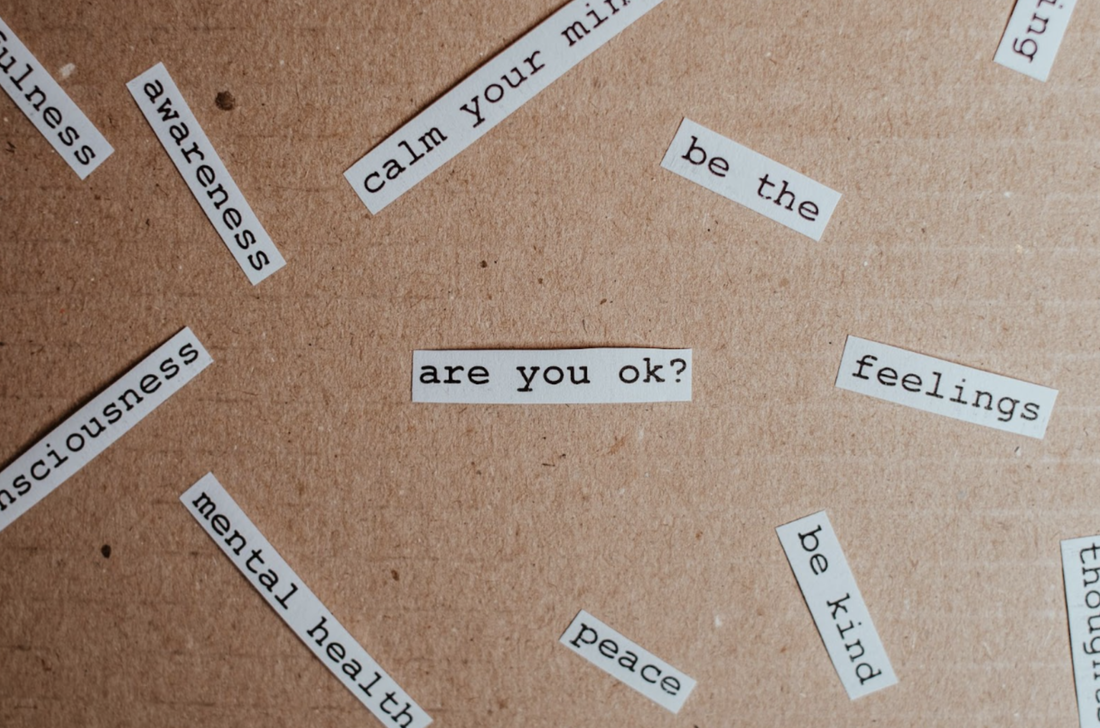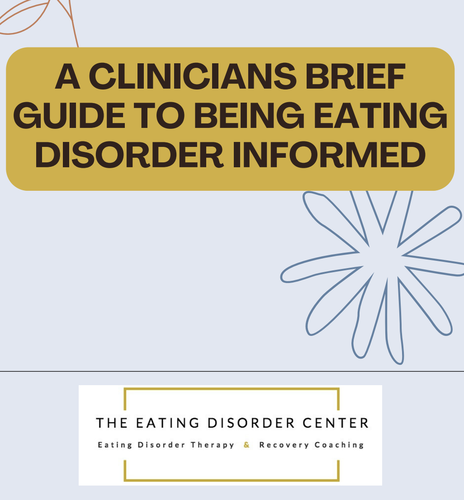|
By Megan Samuels, MSW, LMSW, Outreach Coordinator This blog will discuss eating disorder recovery, what it means, how it can differ from other forms of recovery, and how recovery takes time. The end of this blog offers some journal prompts for further reflection. These journal prompts can be done independently, with supportive friends or loved ones, or with your therapist or other treatment team members. Eating disorder recovery may mean different things to different people. For many folks, eating disorder recovery means that being able to live a life free from eating disorder thoughts, behaviors, and urges. For others, it may mean being able to return to a sports team or to be able to eat intuitively. When we think about recovery from drugs and/or substance use, we think about abstinence from the drug or substance. This would mean not engaging with that substance or drug. Oftentimes, people in recovery from substances may earn “chips” to signify how many days “clean” or “sober” they are. This is what can make eating disorder recovery messy - we can’t abstain from food. Recovery often includes decreasing behaviors, thoughts, and urges while also finding replacement behaviors, un-learning diet culture, and eating enough food. Meanwhile, we are also in school, working, parenting, etc. That’s a lot to juggle! Recovery can take time-and the journey is different for each individual. If you think about the Hasbro children’s game, Candy Land, there is a path, however sometimes you will land on a spot where you can move forward quickly or move backwards unexpectedly. In terms of recovery from an eating disorder, we may move more quickly though the path of recovery with a treatment team who specializes in eating disorders or supportive family members who are able to provide meal support. On the flip side, we may move backwards unexpectedly if there is another life stressor that is making it more challenging to make recovery-oriented choices. Regardless of the timeline, the first step to recovery is getting help. This can mean reaching out to our team to schedule a free 15-minute consultation for eating disorder therapy and/or recovery coaching - you do not have to do this alone. We would love to support your healing journey and help you explore and reach your recovery goals. Journal Prompts:
Schedule a free 15 min consult for eating disorder therapy in MD, VA, DC, NY, FL, or recovery coaching worldwide. Click here. *Disclaimer: The information is provided for educational and informational purposes only. It is not intended to be a substitute for your independent medical decision-making nor a recommendation or endorsement for any particular treatment plan, organization, provider, professional service, or product. The information may change without notice. No claims, promises, or guarantees are made about the completeness, accuracy, currency, content or quality of information linked. You assume all responsibility and risk for any use of the information. The Eating Disorder Center is a premier outpatient eating disorder therapy center founded by Jennifer Rollin. We specialize in helping teens and adults struggling with anorexia, binge eating disorder, bulimia, OSFED, and body image issues. We provide eating disorder therapy in Rockville, MD, easily accessible to individuals in Potomac, North Potomac, Bethesda, Olney, Silver Spring, Germantown, and Washington D.C. We also provide eating disorder therapy in Arlington, Virginia and virtually throughout Virginia. Additionally, we offer eating disorder therapy virtually in New York (NYC), Florida, and California. We provide eating disorder recovery coaching via Zoom to people worldwide. Connect with us through our website at www.theeatingdisordercenter.com
Are you exhausted from constantly thinking about food and your body? Maybe part of you is desperately wanting to be free from this, yet scared to begin recovery. Or perhaps you are worried about a loved one and their relationship to food and their body. Our eating disorder therapists serving clients in Arlington, Virginia and virtually throughout Virginia can help. If you're looking to heal your relationship to food, your body and yourself-you've come to the right place. We offer eating disorder therapy serving teens and adults in Arlington, Virginia, with anorexia, bulimia, binge eating disorder, ARFID, disordered eating, and compulsive exercise. Many of us on the team are personally recovered from our own eating disorders or have supported a loved one in recovery. We offer a free 15 min consult to see if it's a good fit! We provide therapy to clients with eating disorders virtually via video to individuals throughout Virginia-including those residing in McLean, Fairfax, Arlington, Alexandria, and Woodbridge. The Eating Disorder Center is a premier outpatient eating disorder therapy center founded by Jennifer Rollin. We specialize in helping teens and adults struggling with anorexia, binge eating disorder, bulimia, OSFED, and body image issues. We provide eating disorder therapy in Rockville, MD, easily accessible to individuals in Potomac, North Potomac, Bethesda, Olney, Silver Spring, Germantown, and Washington D.C. We also provide eating disorder therapy in Arlington, Virginia and virtually throughout Virginia. Additionally, we offer eating disorder therapy virtually in New York (NYC), Florida, and California. We provide eating disorder and EMDR trauma therapy in Rockville, Maryland and virtually throughout Maryland. We provide eating disorder recovery coaching via Zoom to people worldwide. Connect with us through our website at www.theeatingdisordercenter.com
We are excited to announce that our blog has been named number 26 out of 100 Best Eating Disorder Blogs! Our blog provides content for clinicians, individuals struggling with an eating disorder, and loved ones looking for information on how to support someone with an eating disorder. Our team is happy to provide blog content with the goal of helping to increase education and awareness about eating disorders. Our blog features content around eating disorders, eating disorder recovery, body image, OCD, anxiety disorders, bipolar disorder, trauma-informed care, and more! Here is the list of the 100 Best Eating Disorder Blogs: If you or a loved one is struggling with an eating disorder or body image, our team would love to help! Schedule a free 15 min consult for eating disorder therapy in MD, VA, DC, NY, FL, or recovery coaching worldwide. Click here The Eating Disorder Center is a premier outpatient eating disorder therapy center founded by Jennifer Rollin. We specialize in helping teens and adults struggling with anorexia, binge eating disorder, bulimia, OSFED, and body image issues. We provide eating disorder therapy in Rockville, MD, easily accessible to individuals in Potomac, North Potomac, Bethesda, Olney, Silver Spring, Germantown, and Washington D.C. We also provide eating disorder therapy in Arlington, Virginia and virtually throughout Virginia. Additionally, we offer eating disorder therapy virtually in New York (NYC), Florida, and California. We provide eating disorder recovery coaching via Zoom to people worldwide. Connect with us through our website at www.theeatingdisordercenter.com
By Jennifer Rollin, MSW, LCSW-C Many individuals who struggle with eating disorders have a harsh inner critic. Some folks also struggle with perfectionism and “all or nothing thinking.” One example of “all or nothing thinking” and self-criticism in eating disorder recovery is as follows:
A more self-compassionate response:
Many people believe that being highly self-critical will help them to succeed or is motivating in some way. However, if you think about a small child who was learning something for the first time - do you think that a parent being highly critical would help that child to learn? Often, it’s easier for folks to visualize being kinder to others than to themselves. Eating disorder recovery can be tough at times - and being hard on oneself can serve to only make things feel more painful. However, the way we speak to ourselves can become habitual, so it can take some time and practice to change our relationship to ourselves. The following are a few ways to practice more self-compassion in eating disorder recovery. 1. Start to notice the things that trigger you to be self-critical.
2. If self-compassion feels inaccessible at first, think about how you can start by speaking more neutrally to yourself.
3. Think of your best friend or a small child in your life and how you would speak to them.
The Bottom Line Like any new skill, practicing self-compassion (and thus changing your relationship with yourself) can take time and practice. If you are struggling with motivation to work on being kinder to yourself in eating disorder recovery, consider doing a pro/con list and looking at the ways that harsh self-criticism may be negatively impacting you. You cannot shame yourself into healing. You deserve to treat yourself more compassionately. Schedule a free 15 min consult for eating disorder therapy in MD, VA, DC, NY, FL, or recovery coaching worldwide. Click here. The Eating Disorder Center is a premier outpatient eating disorder therapy center founded by Jennifer Rollin. We specialize in helping teens and adults struggling with anorexia, binge eating disorder, bulimia, OSFED, and body image issues. We provide eating disorder therapy in Rockville, MD, easily accessible to individuals in Potomac, North Potomac, Bethesda, Olney, Silver Spring, Germantown, and Washington D.C. We also provide eating disorder therapy in Arlington, Virginia and virtually throughout Virginia. Additionally, we offer eating disorder therapy virtually in New York (NYC), Florida, and California. We provide eating disorder recovery coaching via Zoom to people worldwide. Connect with us through our website at www.theeatingdisordercenter.com
By Megan Samuels, MSW, LMSW, Outreach Coordinator Eating disorders differ from other mental health disorders as they often require a multi-disciplinary approach. What that means is that multiple specialties may be needed to monitor and reduce symptoms. Having a multi-disciplinary team can improve and speed up recovery outcomes and treatment goals, especially if team members collaborate with one another frequently. Here are some people who may be a part of your eating disorder recovery treatment team:
Please note that eating disorders often require specialized and unique care and treatment plans, so your team may look different than what’s outlined above! This is just a general list of people you may consider when putting together a treatment team. You can also download this graphic that outlines the first four treatment team components that were listed above. Check out some of our other blogs!
*Disclaimer: The information is provided for educational and informational purposes only. It is not intended to be a substitute for your independent medical decision-making nor a recommendation or endorsement for any particular treatment plan, organization, provider, professional service, or product. The information may change without notice. No claims, promises, or guarantees are made about the completeness, accuracy, currency, content or quality of information linked. You assume all responsibility and risk for any use of the information. Schedule a free 15 min consult for eating disorder therapy in MD, VA, DC, NY, FL, or recovery coaching worldwide. Click here. The Eating Disorder Center is a premier outpatient eating disorder therapy center founded by Jennifer Rollin. We specialize in helping teens and adults struggling with anorexia, binge eating disorder, bulimia, OSFED, and body image issues. We provide eating disorder therapy in Rockville, MD, easily accessible to individuals in Potomac, North Potomac, Bethesda, Olney, Silver Spring, Germantown, and Washington D.C. We also provide eating disorder therapy in Arlington, Virginia and virtually throughout Virginia. Additionally, we offer eating disorder therapy virtually in New York (NYC), Florida, and California. We provide eating disorder recovery coaching via Zoom to people worldwide. Connect with us through our website at www.theeatingdisordercenter.com
By Megan Samuels, MSW, LMSW, Outreach Coordinator This year, eating disorder awareness week is from Monday, February 26 to Sunday, March 3, 2024. Eating disorder awareness week helps to promote education about eating disorders and get people connected with treatment options. I wanted to provide some statistics to emphasize that eating disorders do not discriminate - they are happening all around us and they are impacting people of all races, ethnicities, religions, and sexual orientations. The second half of this blog will dive into warning signs and symptoms of eating disorders.
These statistics help to illustrate that eating disorders don’t have a “look” and that there is no “right” or “wrong” way to have an eating disorder. Eating disorder symptoms can also differ from person to person. A lot of people think of eating disorders as weight loss, restricting or purging, but there are many other warning signs that someone may be struggling with an eating disorder. Some other common symptoms and symptoms:
These are some of the specific symptoms around food and body image that someone with an eating disorder may exhibit. One of the things that makes eating disorders unique and complex is that they often co-occur with another mental health disorder. For example, someone with an eating disorder may also be experiencing a mood disorder, OCD, trauma, or an anxiety disorder. Finding a specialist who can treat both the eating disorder and the co-occurring disorders can be difficult to find. It’s so important to see someone who truly specializes in eating disorder treatment. At The Eating Disorder Center, our clinicians can assess and treat eating disorders and some co-occurring disorders. We can provide a one time assessment or ongoing therapy or coaching services for yourself or for a loved one. Please contact us today to see how we can help support your healing journey! Schedule a free 15 min consult for eating disorder therapy in MD, VA, DC, NY, FL, or recovery coaching worldwide. Click here. The Eating Disorder Center is a premier outpatient eating disorder therapy center founded by Jennifer Rollin. We specialize in helping teens and adults struggling with anorexia, binge eating disorder, bulimia, OSFED, and body image issues. We provide eating disorder therapy in Rockville, MD, easily accessible to individuals in Potomac, North Potomac, Bethesda, Olney, Silver Spring, Germantown, and Washington D.C. We also provide eating disorder therapy in Arlington, Virginia and virtually throughout Virginia. Additionally, we offer eating disorder therapy virtually in New York (NYC), Florida, and California. We provide eating disorder recovery coaching via Zoom to people worldwide. Connect with us through our website at www.theeatingdisordercenter.com *Disclaimer: The information is provided for educational and informational purposes only. It is not intended to be a substitute for your independent medical decision-making nor a recommendation or endorsement for any particular treatment plan, organization, provider, professional service, or product. The information may change without notice. No claims, promises, or guarantees are made about the completeness, accuracy, currency, content or quality of information linked. You assume all responsibility and risk for any use of the information. References:
By Megan Samuels, MSW, LMSW, Outreach Coordinator People struggling with bipolar disorder can experience mood fluctuations that may be severe and that can impair everyday functioning. While we cannot prevent all contributions to clinically impairing mood fluctuations, such as a potential genetic predisposition, we can take a look at other areas of a person’s life to reduce the intensity or frequency of mood fluctuations. Some other factors that can contribute to the intensity and frequency of mood fluctuations in folks with bipolar disorder include stress, major life events or life changes, and lack of regular and plentiful sleep. This blog will outline some priorities to focus on when it comes to reducing or maintaining symptoms of bipolar disorder. Some priorities include:
These priorities can be things to think about or conversations to have with your loved ones and/or treatment team. Remember that no two people are the same, so these priorities may have to be shifted or altered to best support someone’s journey with bipolar disorder. My hope is that this provides a starting place for thinking through how to prevent and decrease triggers of bipolar disorder and live a more fulfilling life - with less mood swings that interfere with daily functioning. Working with professionals who are highly knowledgeable about bipolar disorder can feel refreshing and hopeful. Check out our other blog posts about bipolar disorder: Our practice sees individuals with bipolar disorder for virtual therapy in Maryland, Virginia, and Florida. If you are struggling with bipolar disorder click the link below to schedule a free 15 min phone consultation with a therapist. Click here. The Eating Disorder Center is a premier outpatient eating disorder therapy center founded by Jennifer Rollin. We specialize in helping teens and adults struggling with anorexia, binge eating disorder, bulimia, OSFED, and body image issues. We provide eating disorder therapy in Rockville, MD, easily accessible to individuals in Potomac, North Potomac, Bethesda, Olney, Silver Spring, Germantown, and Washington D.C. We also provide eating disorder therapy in Arlington, Virginia and virtually throughout Virginia. Additionally, we offer eating disorder therapy virtually in New York (NYC), Florida, and California, serving those in cities including Palo Alto, San Francisco, Newport Beach, Los Angeles, Woodland Hills, San Jose, and Beverly Hills. We provide eating disorder recovery coaching via Zoom to people worldwide. Connect with us through our website at www.theeatingdisordercenter.com
*Disclaimer: If you are having thoughts of death/harm to yourself or someone else, call 988 or text HOME to 741-741. If you need immediate assistance, call 911 or go to the nearest emergency room. *Disclaimer: The information is provided for educational and informational purposes only. It is not intended to be a substitute for your independent medical decision-making nor a recommendation or endorsement for any particular treatment plan, organization, provider, professional service, or product. You assume all responsibility and risk for any use of the information. Eating disorders often require specialized treatment. We have created a brief guide that gives clinicians an overview about how to be eating disorder informed. Download the the FREE guide below!
Schedule a free 15 min consult for eating disorder therapy in MD, VA, DC, NY, FL, or recovery coaching worldwide. Click here. The Eating Disorder Center is a premier outpatient eating disorder therapy center founded by Jennifer Rollin. We specialize in helping teens and adults struggling with anorexia, binge eating disorder, bulimia, OSFED, and body image issues. We provide eating disorder therapy in Rockville, MD, easily accessible to individuals in Potomac, North Potomac, Bethesda, Olney, Silver Spring, Germantown, and Washington D.C. We also provide eating disorder therapy in Arlington, Virginia and virtually throughout Virginia. Additionally, we offer eating disorder therapy virtually in New York (NYC), Florida, and California. We provide eating disorder recovery coaching via Zoom to people worldwide. Connect with us through our website at www.theeatingdisordercenter.com
By Megan Samuels, MSW, LMSW, Outreach Coordinator One thing that can be challenging for people struggling with food and body image can be grocery shopping. As grocery shopping is something that most of us can’t avoid, there are some ways to make it easier. 1. Going at non-peak times For people who may get anxious about being around a lot of other people, one thing that can help is going grocery shopping when you wouldn't expect a lot of other people to be going grocery shopping. For example, weekday mornings may be an ideal time to go grocery shopping as most people would be at work/school. I have also found grocery stores less crowded on weekend mornings compared to weekend afternoons and evenings. With not as many people at the grocery store, it can be easier to search for the items that support your lifestyle and your recovery. Additionally, there will likely be more access to the people who work there if you have questions or are having trouble finding a product. Going at non-peak times can also alleviate the pressure of finding a parking space, if you drive to the grocery store. 2. Having a list prepared One thing that can take some of the pressure off of grocery shopping is creating a list of foods, drinks, etc. that you are looking to buy. Here are some steps to help create a list.
For this list, you can add the items you are looking to get to the “Notes” app on your phone or hand write the items on a piece of paper. *Please note that this tip can vary depending on where you are in your recovery journey. Work with your therapist, dietitian, and/or coach to determine if this tip is appropriate. 3. Be as regulated as possible Grocery shopping can be a stressful task for people with eating disorders. Another tip to go grocery shopping is to be as prepared as possible. This may include eating a snack or a meal beforehand and drinking plenty of water so you are not hungry or thirsty while you are grocery shopping. You can even bring a water bottle or a snack if needed. Also paying attention to your energy level is important. Are you feeling tired? Do you need to take a nap before grocery shopping? Another thing that may be helpful is going grocery shopping with a friend or a loved one. This can provide some co-regulation and general support if you find yourself struggling to get some of the items on your list because of diet culture or other societal/individual pressures. Other ideas can include engaging in some mindfulness before entering the grocery store. This can look like doing some deep breathing or a quick meditation.
In conclusion, there are things that we can do to make going to the grocery store a little easier. If this is something that you struggle with, this could be a great conversation to have with your treatment team. Note: Aside from people struggling with food and body, some people who are neurodivergent or who struggle with sensory input may also benefit from the tips in this blog post. Schedule a free 15 min consult for eating disorder therapy in MD, VA, DC, NY, FL, or recovery coaching worldwide. Click here. The Eating Disorder Center is a premier outpatient eating disorder therapy center founded by Jennifer Rollin. We specialize in helping teens and adults struggling with anorexia, binge eating disorder, bulimia, OSFED, and body image issues. We provide eating disorder therapy in Rockville, MD, easily accessible to individuals in Potomac, North Potomac, Bethesda, Olney, Silver Spring, Germantown, and Washington D.C. We also provide eating disorder therapy in Arlington, Virginia and virtually throughout Virginia. Additionally, we offer eating disorder therapy virtually in New York (NYC), Florida, and California. We provide eating disorder recovery coaching via Zoom to people worldwide. Connect with us through our website at www.theeatingdisordercenter.com
By Olivia Kline, EDC Administrative Assistant Content Warning: This blog post discusses trauma. Please practice self-care in whatever way works for you. Adverse childhood experiences (ACEs) can be defined as experiencing neglect, physical and/or emotional abuse, or other adverse experiences before the age of 18. ACEs are considered a public health crisis and are connected to experiencing mental and physical health problems later in life (Rienecke et al., 2022). These experiences can be measured through a questionnaire that asks about early childhood experiences; participants answer with a “yes” or “no”. The number of yes’s are added up giving a total score 0 through 10. In a nationally represented sample of over 200,000 adults, 23.5% reported one ACE and 15.8% reported at least four ACEs (Rienecke et al., 2022). These stats show the prevalence of ACEs, although this is something that is not talked about often, at least in my experience. As a psychology major graduate and current graduate student in a clinical mental health counseling program, the connection between ACEs and risk for mental health disorders makes sense. However, I wasn’t aware of the long-term effects or prevalence of ACEs until I read Dr. Nadine Burke-Harris’s book “The Deepest Well: Healing the Long-Term Effects of Childhood Adversity.” This book enlightened me about the long-term impacts of ACEs and to how they are linked not just to mental health issues, but to physical health problems too. Learning more about the effects of ACEs sparked my curiosity in how they may have a role in eating disorders, as it relates to my current work. Guillaume et al. (2016) conducted a study examining the association between ACEs and clinical characteristics of eating disorders. To investigate this, researchers used a questionnaire that analyzed the following characteristics: restraint, eating, shape and weight concerns, and daily functioning. Childhood trauma was also assessed using a questionnaire. The results suggested that there is an association between clinical aspects of eating disorders and reported childhood trauma. A dose-response effect was also discovered, which means the more childhood trauma an individual experienced the more eating disorder symptoms they reported. Reading and learning about this association can bring up many different emotions. Relief is a common feeling, as many feel like they further understand an underlying association to what they are struggling with. This can also be overwhelming or anxiety inducing as it’s a lot to take in and digest. These are all valid reactions. Given the impact of ACES, there are also studies that have researched how to achieve the best outcomes within these situations. Research recommends that clinicians should utilize trauma-informed care and trauma-focused interventions when treating individuals for eating disorders who have adverse childhood experiences (Brewerton, 2022). Here, at the Eating Disorder Center all of our clinicians are trauma-informed, making us unique from other practices. At the Eating Disorder Center we realize that clients all have backgrounds and layers related to their eating disorders, which is why trauma-informed care is so important. The Eating Disorder Center can help you start your recovery journey or support you through recovery! We have therapists that can help in MD, DC, VA, & FL, as well as coaches worldwide that can assist you through your journey. References:
Schedule a free 15 min consult for eating disorder therapy in MD, VA, DC, NY, FL, or recovery coaching worldwide. Click here. The Eating Disorder Center is a premier outpatient eating disorder therapy center founded by Jennifer Rollin. We specialize in helping teens and adults struggling with anorexia, binge eating disorder, bulimia, OSFED, and body image issues. We provide eating disorder therapy in Rockville, MD, easily accessible to individuals in Potomac, North Potomac, Bethesda, Olney, Silver Spring, Germantown, and Washington D.C. We also provide eating disorder therapy in Arlington, Virginia and virtually throughout Virginia. Additionally, we offer eating disorder therapy virtually in New York (NYC), Florida, and California. We provide eating disorder recovery coaching via Zoom to people worldwide. Connect with us through our website at www.theeatingdisordercenter.com
|
The Eating Disorder CenterWe are a premier outpatient eating disorder therapy center in Rockville, Maryland. Archives
July 2024
Categories |
||||||










 RSS Feed
RSS Feed